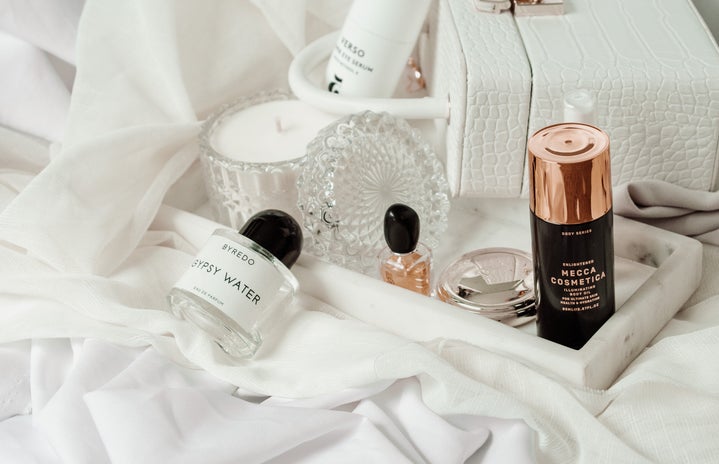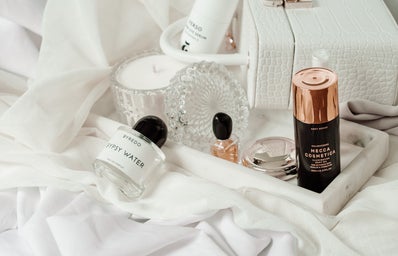Face oil has been taking the beauty industry by storm as a multi-use product. While it’s commonly known to be used as an effective makeup remover, it has recently earned praise for being a healthy moisturizer as well as a gentle cleanser. Everyone from celebrities and dermatologists to average collegiettes uses this beauty hack, but how do you know when (or how) you should use face oil? We’re here to break down the benefits, costs and uses for all types of face oils—even the ones you may not have known existed.
Why should you use face oils?
According to Dr. Debra Jaliman , assistant clinical professor of dermatology at the Icahn School of Medicine at Mount Sinai and author of Skin Rules, “the benefits of using facial oils are that they are moisturizing and many contain antioxidants. If you’re using anti-aging products, they can prevent some of the irritation caused by these products.”
Face oils are able to absorb into the skin faster and more effectively than a cream or gel moisturizer. While over-the-counter moisturizers typically contain a mixture of oil and water, face oils are purer and are able to penetrate the surface of the skin in a quicker and gentler way.
How much do face oils cost?
“Coconut oil is probably the least expensive oil to take out of the jar and use on your skin,” says Jaliman. “It’s when these oils are made into a skin product that they become more expensive.”
Jaliman says that many oils that can be used on your face can be found at the grocery store. One example is olive oil, an inexpensive product that can be used as an effective makeup remover, as it’s able to cling to oil-based products, like eye makeup, on your skin. And if you’re looking to find a face oil with extra health benefits and are willing to spend more money, try an oil chock-full of antioxidants (to repair and protect skin cells while maintaining your youthful glow) like grape seed oil. “Grape seed oils are more expensive because they contain a high concentration of antioxidants,” Jaliman notes.
Some well-known brands also offer face oils for those who are willing to invest in more high-end beauty products. Bridget Higgins, a sophomore at University of Massachusetts, Amherst, picked up a pricier oil to use as a moisturizer. “I use Tarte Maracuja Oil ($48, tartecosmetics.com) for my face and it’s so much more moisturizing and nonirritating than lotion in my opinion,” she says. “It makes your face look so much brighter!”
So, there are a wide variety of options for every collegiette’s budget, meaning face oil doesn’t have to be just for the rich and famous; you can try it yourself by spending anywhere from $5 to $50 and still get great results!
Related: 5 Mistakes You’re Probably Making When Washing Your Face
How can you use face oils?
As a moisturizer:
You know that gross, sticky feeling that comes with using a thick cream moisturizer on your face when you are experiencing super dry skin? Well, oil may just be your new best friend. While many people think that oil can turn dry skin into greasy skin, it can actually leave you with a moisturized, healthy glow! By using an oil (such as olive oil, coconut oil, almond oil, or vitamin E oil) on your face, you can eliminate that feeling of dryness while also avoiding rubbing a thick and sticky moisturizer all over.
Courtney Klauber, a graduate of Rowan University, says she uses vitamin E oil to moisturize her skin. “It’s great because it’s lightweight, prevents and heals any discoloration or scars from acne or any other marks, it never makes me break out and it helps with my dry skin,” she says. “I’ve also used organic Moroccan oil as well on my face and it made my skin really smooth and evens out my pores.”
To use an oil as a moisturizer, simply soak a cotton round in the oil and apply the desired amount to your face as needed.
As a makeup remover or cleanser:
When you think of oil, you probably imagine the type you are trying to get rid of, like that pesky variety that shows up on your skin midday. But believe it or not, oils such as jojoba oil and coconut oil are wonderful makeup removers and cleansers that can be used to effectively and easily get rid of that unwanted oil, while also removing dirt and makeup!
Dani Kluss, a sophomore at California Lutheran University, describes why coconut oil works the best for her. “The organic coconut oil naturally [combated] the oil that my skin produced, which solved a lot of my problems,” she says. But how does it work? Apparently, face oil can be used to combat naturally occurring oil by restoring the balance of your skin in order to slow down oil production. However, Jaliman cautions that she does not recommend using too much oil on oily skin, as overuse may clog pores or even make acne worse in cases of excessive use.
Nonetheless, “using coconut oil as a makeup remover has many perks,” says Kluss. “It softens and moisturizes skin, doesn’t contain any harsh chemicals, is super effective and easy to use. Organic Coconut Oil works fantastically as a natural makeup remover to remove makeup instantly and effectively.”
Coconut oil often comes in a solid form, and the way it is used varies by personal preference. If you prefer to use your hands when moisturizing or removing makeup, use a spoon to scoop a small amount of coconut oil onto your hands and slowly warm the product with your fingers before gently applying it to your skin or eye area. You can also use coconut oil on a cotton round by scooping a small amount into a bowl and microwaving it for a few seconds until it adopts a liquid form. Let it cool before soaking a cotton round in the oil and then use as desired!
As an antioxidant booster:
Sometimes, your skin is just begging for nutrients, and one way to provide your skin with what it needs is through using an antioxidant-rich oil. Argan oil, borage seed oil, cranberry seed oil, rosehip oil and seaberry (or Sea Buckthorn) oil are all rich in antioxidants, which are beneficial for your skin. Why? Antioxidants form a complex with free radicals in order to prevent damage to the collagen and elastic tissues in your skin, causing you to appear more youthful and radiant, says Jaliman.
Sydney Brodie, a senior at the University of Florida, uses antioxidant-rich rosehip oil habitually. “It’s totally changed my skin!” she says. “My skin tone has really evened out and I definitely wake up every morning with a glow. It’s also helped the hormonal breakouts I used to get on my chin.”
And because rosehip oil is so rich with beneficial antioxidants, it can help with anti-aging by improving the overall appearance of the skin, including reducing fine lines. Rosehip oil also contains fatty acids that are essential to skin health and can be used as a healthy addition to your skincare routine in order to prevent blemishes from emerging and reduce the appearance of acne scars. Let it be known, however, that if you choose to use rosehip oil, you may have to adapt to the distinct and sometimes off-putting scent.
To use an antioxidant-rich oil, simply apply the oil to the face as needed, using a cotton round or cotton swab for larger or smaller affected areas, respectively.
So, whether you’re trying to improve the appearance of your skin, moisturize or simply effectively remove makeup, oil may be the best decision you’ve ever made. Select a budget and a desired result and try any of these oils to supplement your skincare routine—it’s about time you took advantage of this incredible beauty obsession!
Header image: Ashley Benson / Instagram

